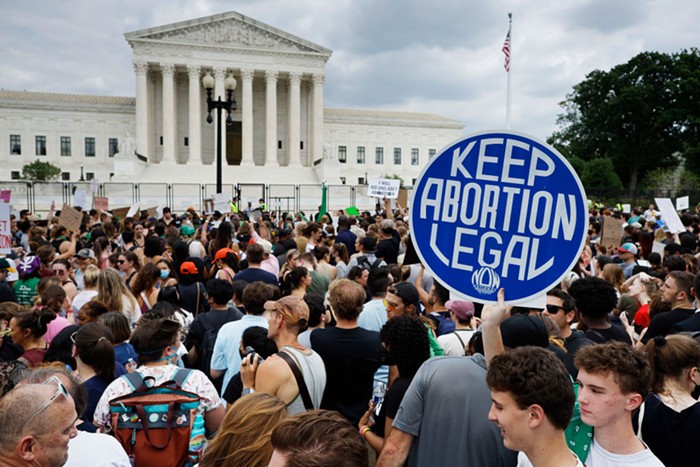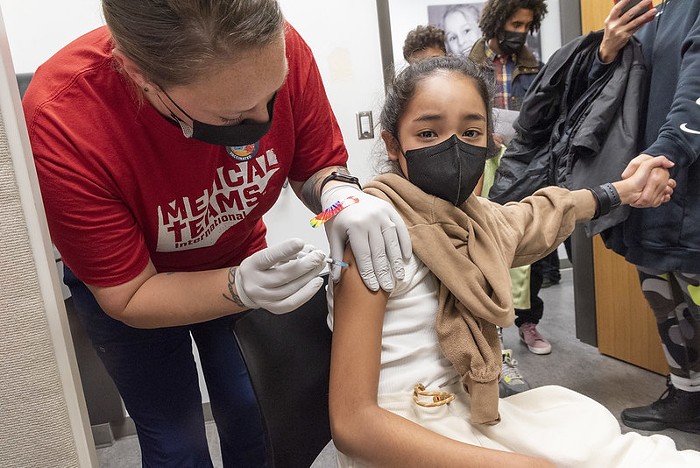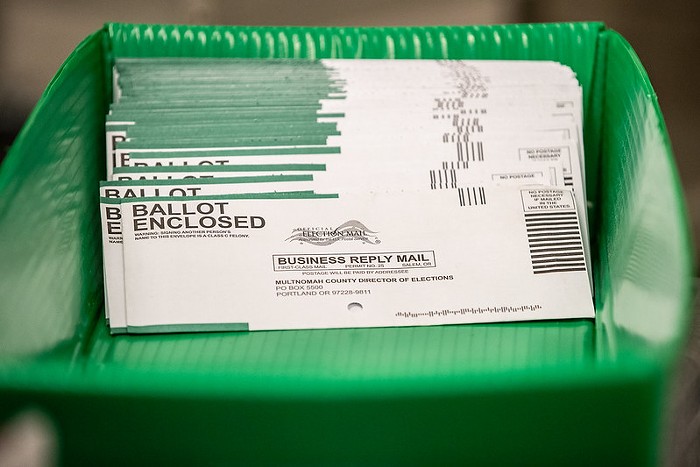
Hours after the US Supreme Court ruled to overturn Roe v. Wade on Friday, reproductive rights advocates in Oregon delivered a clear reminder to Oregonians: Abortion is not banned in the state.
"Regardless of the Supreme Court decision, abortion is still safe and legal in Oregon," said An Do, director of Planned Parenthood Advocates of Oregon, in a morning press conference.
While the Supreme Court's decision to scrap the constitutional rights to an abortion triggers immediate abortion bans in several states, Oregon law enshrines the right to an abortion—and requires insurers to cover it. This policy makes Oregon one of several states preparing to help care for people seeking an abortion in states where the procedure has been banned.
Do said that, while Friday's court ruling was "devastating" to hear, her organization and other Oregon reproductive rights groups "have been preparing for this moment."
"Make no mistake, mitigating the harm that this ruling has on our nation falls on us," said Do. "It is our opportunity to build a future we want to see for our community."
That means having the funds to support out-of-state visitors seeking health care. In March the Oregon Legislature used $15 million in state funds to create the Oregon Reproductive Health Equity Fund, a program administered by the nonprofit Seeding Justice meant to financially back Oregon organizations that provide “immediate and urgent patient needs for abortion funds and practical support." On Friday, Seeding Justice Director Se-ah-dom Edmo announced that the first $1 million of that fund will go towards the Northwest Abortion Access Fund (NWAAF).
NWAAF helps people cover the costs of an abortion, including travel, hotel stays, and childcare, if needed. The funds are not limited to people living in the Pacific Northwest—the program also helps people travel from across the country to get an abortion in Oregon or Washington.
"Access is not access unless you can afford it and can get to your appointment," said Megan Kovacs, a NWAAF board member, at the Friday press conference. Kovacs said the organization saw a 78 percent increase in need for funds from 2020 and 2021, and distributed a total of $800,000 in funding in 2021.
Seeding Justice's Edmo said the group expects to receive the promised funds from the state within the next month or two.
Greyson Dempsey, a spokesperson for the Lilith Clinic, a Portland abortion provider, said the clinic has been seeing a consistent rise in need from out-of-state residents since September 2021, when Texas first passed its law strictly limiting abortion care. Currently, Dempsey said, 25 percent of all patients at the Lilith Clinic are from another state, with 10 percent of them hailing from Texas.
"It’s been a slow burn," said Dempsey in an interview with the Mercury Friday. "We know how the removal of reproductive rights across states impact us. This decision today is only going to exacerbate the stress and trauma for patients who have to jump through unthinkable hoops to get care they need."
Dempsey said the clinic has been preparing for a rollback of abortion protections at the federal level by ramping up the business' infrastructure—from improving the clinic's phone system to improving security against potentially protests. While the Lilith Clinic is prepared to assist a surge in patients, Dempsey expressed concern for other medical providers across the state that may lack adequate resources.
"The medical community has been at breaking point for the last two years," she said. "We need to make sure that people who are on the ground providing abortion care in rural and urban areas can keep their doors open. I would love to see state investments in training programs for the next generation of providers."
Dempsey mentioned how the expected end of abortion in half of the country's states also means an end to medical students being trained in the procedure. Along with providing abortion to out-of-state residents, Dempsey said that Oregon has an opportunity to be a training ground for out-of-state medical professionals interested in reproductive care.
"Oregon should do everything it can to help right now," she said.
Oregon politicians condemned the Supreme Court ruling Friday morning.
"Let me be clear: You cannot ban abortion, you can only ban safe abortions," said Oregon Governor Kate Brown on Friday. "This disgraceful Supreme Court decision will undoubtedly put many people’s lives at risk."
Brown joined the governors of Washington and California in making a "Multi-State Commitment to defend access to reproductive health care" on Friday morning.
All Democratic members of Oregon's congressional delegation also shared their outrage on the opinion in separate statements. In a press statement, the Multnomah County Board of Commissioners condemned the decision, noting that the decision is "poised to undo so much of the progress that the right to abortion has allowed us to make toward women’s ability to participate fully and equally in society." Several members of Portland City Council also shared their disappointment and outrage in the ruling.
While reproductive rights for Oregonians feel relatively safe in 2022, abortion advocates warned the public against taking current freedoms for granted. In a concurrent opinion published Friday, US Supreme Court Justice Clarence Thomas noted that the court should reconsider past rulings related to same-sex marriage and access to contraception. Sandy Chung, director of the ACLU of Oregon, said the hinted-at threat to overturn more constitutional rights shouldn't be taken lightly.
"We cannot feel safe with the rights of any historically disenfranchised community in the United States," said Chung at the Friday press conference. "It very much seems like some of these constitutional rights the Supreme Court may very well come after. I want to impress on folks in Oregon and elsewhere: Don't assume your community is free right now because you haven’t been targeted yet. What we're seeing is extremists across the country have come after transgender people, nonbinary folks... Black, Indigenous and other people of color, voting rights... and so it's really important we look at the bigger picture. The Supreme Court is destabilizing fundamental columns that hold up our democracy. We have to look out for each other. Nobody’s free until everybody's free—because they’re coming after all of us."


















